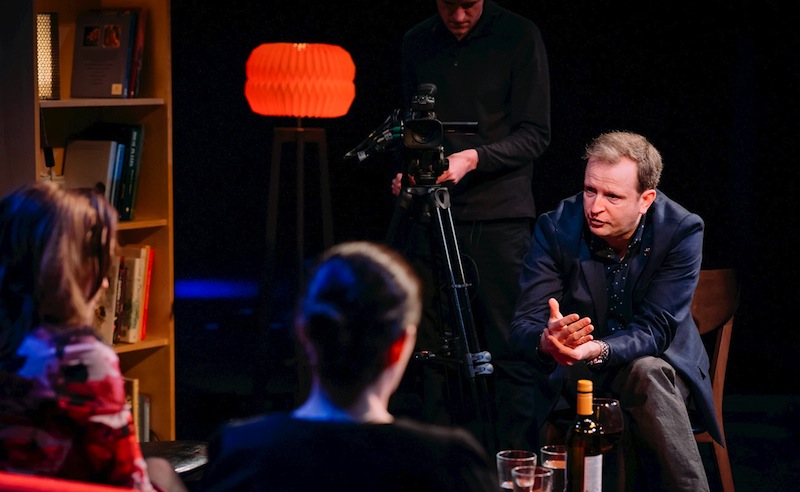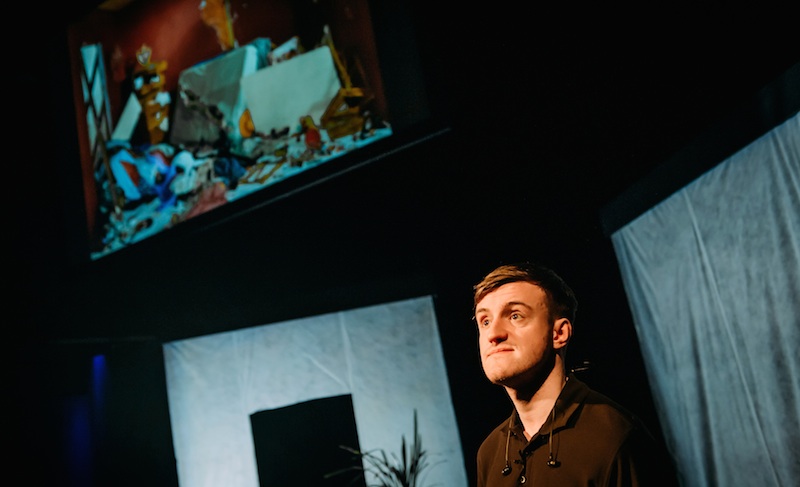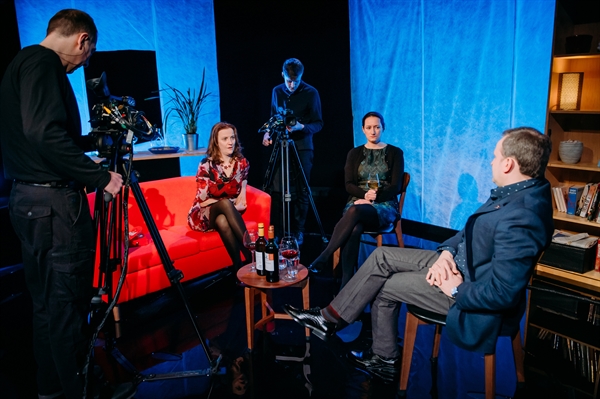The Destroyed Room
★★★★☆ A lens, darkly
Traverse Theatre: Wed 9 – Sat 12 March 2016
Review by Thom Dibdin
It is impossible to tell where the theatre starts and ends in Matthew Lenton’s brilliant, dense and lethally of-the-moment The Destroyed Room, at the Traverse to Saturday before touring to London “and beyond”.
It is a piece in which Lenton takes his fascination with voyeurism and observation up into even greater flights of detail, a script that emerges out of natural debate, a play that borrows from a photograph that borrows from a painting that, itself, borrows from a piece of theatre.
It is true that three actors sit around, speaking in their own voices in a debate that is being recorded and screened on stage, live. Elicia Daly, Barnaby Power and Pauline Goldsmith touch on life and dependants, fear and bravery, the desire for action and the inability to act.
At some point they stop being the actors and it becomes a performance – it is unclear when. Their moment starts with a question, a secret, new question every night, with which one of their number opens the debate. For a few minutes their is true spontaneity, audience interaction even, until the script slips into action, unnoticed.
It all takes its inspiration from Jeff Wall’s 1978 photograph of a destroyed room, itself a reference to Eugene Delacroix’s painting of 1827, Death of Sardanapalus. Inspired by Byron’s play of the same name, the painting shows the death of the Assyrian king Sardanapalus, who ordered the killing of his servants, the destruction of his palace and his own death after hearing of the defeat of his armies in battle.
This seems to be a crucial factor in the understanding of the whole piece, so much so that one of the camera operators delivers a little speech about Jeff Wall’s photo, with images of the two pictures, before welcoming the actors to the stage.
It makes sense of the subjects to which the debate turns: Isis and the refugee crisis in Europe, as the debate becomes all the more heated and begins to break down. And when it finally does so, long-term collaborator Kai Fisher’s beautifully dark set and lighting is used to throw a forensic flashlight on the room and ask: What happened here?
There is a second major frame of reference going on: to do with the way we see the atrocities of Isis – the beheadings and filmed deaths – and the tragedies of the fleeing refugees – the children’s bodies washed up on the beaches of the Mediterranean.
And in this, Lenton is following a line that was seen in his 2009 play Interiors, which was viewed through a glass with a voice describing the action, and then in the 2012 EIF production of Wonderland, in which he examined the nature of the voyeur in pornography.
The subject here is what you might call death porn. And the debate, realistic that it is, never really comes to a conclusion but wanders back and forth, contradicting itself and in the process revealing much more about our relationship with and fascination with filmed death than any formal decision-making debate ever could.
There is a trio of very fine performances from Daly, Power and Goldsmith and solid work from all the creative team – Mark Melville on sound, Jessica Brettle on costume, Fisher, Lenton, the on-stage camera technicians and the company who created the script through improvisation.
But this isn’t just about the look and technical elements of the show, even if they do delight, it is about getting under the skin of an audience, of niggling around and asking where they really stand.
Running time 1 hour 15 minutes (no interval)
Traverse Theatre, 10 Cambridge Street, EH1 2ED
Wednesday 9 – Saturday 12 March 2016
Evenings: 7.30pm.
Tickets and details: http://www.traverse.co.uk/
Battersea Arts Centre, Lavender Hill, London SW11 5TN
Wednesday 27 April – Saturday 14 May 2016
Evenings daily (not Sun & Mon 1 May): 7.30pm.
Tickets and details: https://www.bac.org.uk
ENDS






















